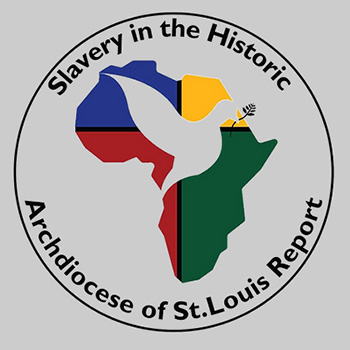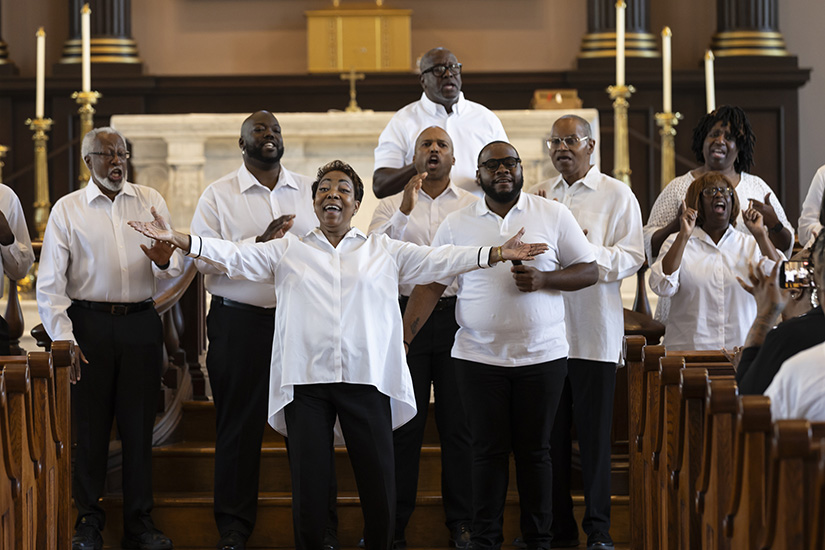“You ought to have received the negros that I charged Fr. Niel to send to you. If he has not done this yet, demand it. I think that the general interest requires that this family should be with you. I regard it, and you should always regard it, as the property of the bishop; but I see in some time to come though the marriage of the children, that this would provide prolific descendants to provide enough workers for the estate of the Bishop of St. Louis and for the seminary.”
Letter from Bishop Louis William Valentine DuBourg to Bishop Joseph Rosati, his coadjutor (assistant), July 29, 1823
In his correspondence, Bishop DuBourg refers to Harry and Jenny Nesbit and their children, whom he purchased in 1822. Seven years later in 1829, the entire family was sold to Bishop Rosati, who had since become the bishop of the new Diocese of St. Louis.

The Nesbit family is among numerous enslaved people highlighted in “Slavery in the Historic Archdiocese of St. Louis,” a 95-page report published by the archdiocese on its involvement in slavery in the 19th century. The report was released at the third annual “Forgive Us Our Trespasses” Maafa procession and prayer service held June 22 in Downtown St. Louis. Maafa, a Swahili word for “great disaster,” is a traditional procession to commemorate the millions of lives lost during the Middle Passage, or transatlantic slave trade.
About 100 people gathered for a prayer service at the Basilica of St. Louis, King of France (Old Cathedral), followed by a one-mile procession to St. John Apostle and Evangelist Church, which included along the way several stops with historical significance, such as the former site of one of Bernard Lynch’s slaveholding pens, Kiener Plaza near the Old Courthouse and the Freedom Suits Memorial.
The archdiocese’s full report includes the names of 99 people who were enslaved, 44 of whom were owned by clergy and diocesan bishops, including Bishop DuBourg, Bishop Rosati and Archbishop Peter Kenrick. There also is information on additional clergy members who were involved in the sales of enslaved people between other clergy, or who rented or had some authority over enslaved people, but did not legally hold them as property.
Researchers with the archdiocesan Office of Archives and Records used published and unpublished sources, including sacramental records, financial ledgers, written correspondence, papal documents and business contracts, among other resources for its report.
Some of the names and identities of enslaved persons have been shared since the research began, including the Nesbit family; a woman named Aspasia, who sued several times for her freedom, before, during and after her enslavement to Bishop Rosati; and Peter, a young boy who was sold by Bishop Rosati for the sum of $150.
 Arvella Strong prayed during the third annual Forgive Us Our Trespasses Prayer Service and Maafa Procession at the Basilica of Saint Louis, King of France (Old Cathedral). Photo Credit: Jerry Naunheim Jr.
Arvella Strong prayed during the third annual Forgive Us Our Trespasses Prayer Service and Maafa Procession at the Basilica of Saint Louis, King of France (Old Cathedral). Photo Credit: Jerry Naunheim Jr. In 2018, the Office of Archives and Records began researching the archdiocese’s involvement in the institution of slavery. In the fall of 2020, Archbishop Mitchell T. Rozanski authorized an expansion of the previous efforts, and the project was formally named “Forgive Us Our Trespasses” in early 2021. He laid out two goals for the project: to promote open and honest access to historic records of enslavement within the local Catholic Church; and to promote community engagement and encourage dialog on the legacies of slavery in the local community.
“This is not the end, only the beginning,” Eric Fair, director of the archdiocesan Office of Archives and Records, said at the June 22 gathering. “The research will not end — there are still unidentified enslaved people in the records, relationships to clarify and there are certainly enslaved individuals who have yet to be uncovered. These will be added to the report as new evidence comes to light. And we will constantly seek ways to communicate those findings … and have conversations, no matter how painful, with the community.”
From a research perspective, Fair said that it’s important to let the information speak for itself, but it’s also critical to acknowledge the sins of the Church and seek forgiveness. “It’s important to acknowledge it was harmful and caused pain to individuals and families,” he said. “You can’t move on as a community and work toward healing and hope without acknowledging the sin and sorrow first.”
Danielle Harrison, who has emceed the Maafa procession and prayer service every year since the annual event was first held in 2022, said the event is a spiritual gathering that speaks to the tie between slavery and efforts to dismantle racism today.
 Anita Watkins-Stevens led the The Gospel Symphonic Choir during the the third annual Forgive Us Our Trespasses Prayer Service and Maafa Procession in the Old Cathedral.Photo Credit: Jerry Naunheim Jr.
Anita Watkins-Stevens led the The Gospel Symphonic Choir during the the third annual Forgive Us Our Trespasses Prayer Service and Maafa Procession in the Old Cathedral.Photo Credit: Jerry Naunheim Jr.“Not everyone will understand why this is so important to have a report that talks about this part of our history, but as we continue to confess the sin of slavery and our complicity in it, that’s where true healing begins,” said Harrison, who attends St. Joseph Parish in Lebanon, Illinois.
This was the second Maafa for Pam White, a member of St. Josephine Bakhita Parish in St. Louis. She said she appreciated hearing Archbishop Rozanski and others publicly acknowledge the wrongs of the Church — transgressions that Black Catholics have known about for a long time.
But equally important was acknowledging the names of those who were enslaved by Catholic bishops and clergy, White said. The program included a litany featuring the names, and ending with the words, “and all those yet to be identified.”
“It shows that the Catholic Church has acknowledged the wrongs that were done and they are not just paying a lip service,” White said. “They’re trying to right things, and the process is still going on.”
The report can be found at www.racialharmonystl.org/historic-archdiocese.